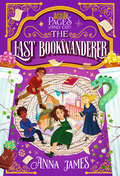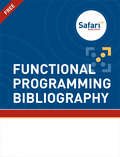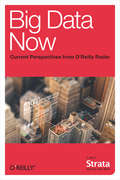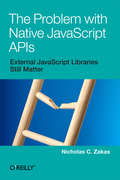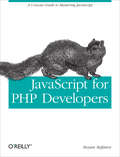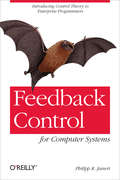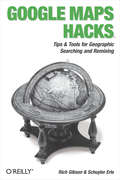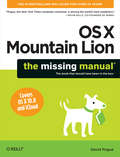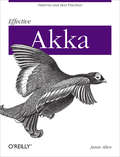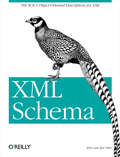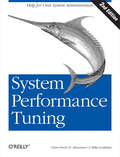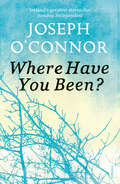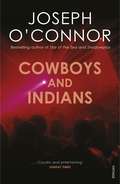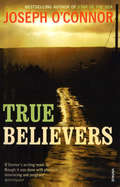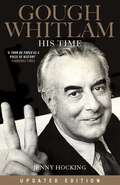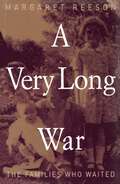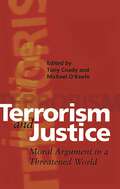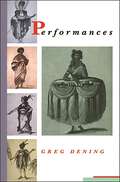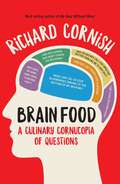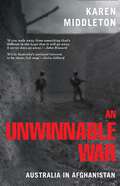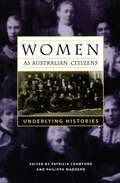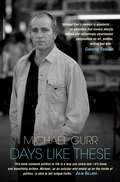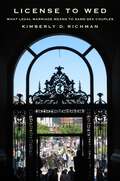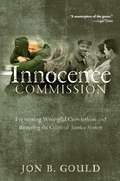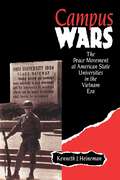- Table View
- List View
Pages & Co.: The Last Bookwanderer (Pages & Co. #6)
by Anna JamesThe final magical bookwandering adventure in the USA Today bestselling Pages & Co. series featuring Milo and Tilly as they travel into Arthurian legend to find the first bookwanderer! Perfect for fans of The Secret Library, Chris Colfer's A Tale of Magic, Mr. Lemoncello's Library, and Lockwood & Co.!When Milo, Tilly, Oskar, and Alessia venture into Arthurian legend to find the first bookwanderer—the wizard Merlin—they discover that the magic of bookwandering is not at all what they thought.Together, they must journey into Greek and Norse mythology—to bargain with the trickster Loki and unlock their destinies with the help of the three Fates—and find a way to untangle the Alchemist&’s grip on the world&’s imagination. To save Pages & Co.and protect the very foundations of book-wandering, the friends will have to learn the true power of imagination, all while an unexpected enemy stands in their way.The Pages & Co. series comes to an end in this thrilling final installment! Perfect for book lovers, those who love magical adventure stories, and those who enjoyed The Train to Impossible Places!
Functional Programming Bibliography
by Safari Content TeamToday, functional programming is emerging from the shadows. It turns out that when you program imperatively (viewing variables as slots in memory with changeable values), you create programs that are difficult for you to reason about when concurrency is introduced. Furthermore, thread-based concurrency techniques have not proven to be effective in enabling developers to write scalable applications. Functional languages help solve these problems by discouraging you from changing the values of variables and by providing alternate concurrency mechanics, such as actors (message-passing objects).We have created a collection of books in this bibliography on the languages and libraries of modern industrial-strength functional programming. There are books on Scala, Haskell, Erlang, Clojure, F# and R. We’ve even listed books on applying functional techniques to work in normally-imperative languages, like C# and Java, and books to get you started if you don’t know anything about functional programming. Finally, we’ve listed a few books on the libraries and frameworks that we think are most helpful in writing enterprise-grade applications in functional languages.
Big Data Now: Current Perspectives from O'Reilly Radar
by O'Reilly Radar TeamThis collection represents the full spectrum of data-related content we’ve published on O’Reilly Radar over the last year. Mike Loukides kicked things off in June 2010 with “What is data science?” and from there we’ve pursued the various threads and themes that naturally emerged. Now, roughly a year later, we can look back over all we’ve covered and identify a number of core data areas: Data issues -- The opportunities and ambiguities of the data space are evident in discussions around privacy, the implications of data-centric industries, and the debate about the phrase “data science” itself. The application of data: products and processes – A “data product” can emerge from virtually any domain, including everything from data startups to established enterprises to media/journalism to education and research. Data science and data tools -- The tools and technologies that drive data science are of course essential to this space, but the varied techniques being applied are also key to understanding the big data arena.The business of data – Take a closer look at the actions connected to data -- the finding, organizing, and analyzing that provide organizations of all sizes with the information they need to compete.
The Problem with Native JavaScript APIs: External JavaScript Libraries Still Matter
by Nicholas C. ZakasMany features inspired by popular JavaScript libraries are now available as native JavaScript APIs in today’s powerful browsers. While that may seem convenient given all of the JavaScript you need to write, relying on these APIs will only make code maintenance more difficult in the long run.In this report, Nicholas Zakas—consultant and former front-end tech leader at Yahoo!—provides a case study to show how different browsers can develop native APIs for the same specification and still end up with different interpretations. You’ll discover how these APIs can tie your code to specific browsers, forcing you to upgrade application logic whenever new browsers and new browser versions are released.
JavaScript for PHP Developers: A Concise Guide to Mastering JavaScript
by Stoyan StefanovIf you want to significantly expand your web development skills beyond PHP, this practical, hands-on book teaches you ECMAScript—the core JavaScript language—from the ground up. You’ll discover some similarities between JavaScript and PHP, such as conditions and loops, but the primary focus is on JavaScript’s unique object creation, classes, prototypes, and inheritance.JavaScript knowledge is essential for working with today’s Web, whether you’re building applications for the client, the server, or for mobile use—and your PHP experience gives you a head start. This book will help you become fluent with JavaScript quickly, and then serve as a handy reference once you start coding.Explore JavaScript syntax, including variables, arrays, loops, and conditionsLearn how functions are important in JavaScript—and why they’re actually objectsDelve into JavaScript’s object-oriented features, including prototypes, code reuse, and inheritanceExamine the built-in API and explore its global functions, properties, and objectsLearn about updates in ECMAScript5, the latest version of the standardUse common design patterns to organize your code in large applications
Feedback Control for Computer Systems: Introducing Control Theory to Enterprise Programmers
by Philipp K. JanertHow can you take advantage of feedback control for enterprise programming? With this book, author Philipp K. Janert demonstrates how the same principles that govern cruise control in your car also apply to data center management and other enterprise systems. Through case studies and hands-on simulations, you’ll learn methods to solve several control issues, including mechanisms to spin up more servers automatically when web traffic spikes.Feedback is ideal for controlling large, complex systems, but its use in software engineering raises unique issues. This book provides basic theory and lots of practical advice for programmers with no previous background in feedback control.Learn feedback concepts and controller designGet practical techniques for implementing and tuning controllersUse feedback “design patterns” for common control scenariosMaintain a cache’s “hit rate” by automatically adjusting its sizeRespond to web traffic by scaling server instances automaticallyExplore ways to use feedback principles with queueing systemsLearn how to control memory consumption in a game engineTake a deep dive into feedback control theory
Google Maps Hacks: Foreword by Jens & Lars Rasmussen, Google Maps Tech Leads (Hacks)
by Schuyler Erle Rich GibsonWant to find every pizza place within a 15-mile radius? Where the dog parks are in a new town? The most central meeting place for your class, club or group of friends? The cheapest gas stations on a day-to-day basis? The location of convicted sex offenders in an area to which you may be considering moving? The applications, serendipitous and serious, seem to be infinite, as developers find ever more creative ways to add to and customize the satellite images and underlying API of Google Maps.Written by Schuyler Erle and Rich Gibson, authors of the popular Mapping Hacks, Google Maps Hacks shares dozens of tricks for combining the capabilities of Google Maps with your own datasets. Such diverse information as apartment listings, crime reporting or flight routes can be integrated with Google's satellite imagery in creative ways, to yield new and useful applications.The authors begin with a complete introduction to the "standard" features of Google Maps. The adventure continues with 60 useful and interesting mapping projects that demonstrate ways developers have added their own features to the maps. After that's given you ideas of your own, you learn to apply the techniques and tools to add your own data to customize and manipulate Google Maps. Even Google seems to be tacitly blessing what might be seen as unauthorized use, but maybe they just know a good thing when they see one.With the tricks and techniques you'll learn from Google Maps Hacks, you'll be able to adapt Google's satellite map feature to create interactive maps for personal and commercial applications for businesses ranging from real estate to package delivery to home services, transportation and more. Includes a foreword by Google Maps tech leads, Jens and Lars Rasmussen.
OS X Mountain Lion: The Missing Manual
by David PogueWhat do you get when you cross a Mac with an iPad? OS X 10.8 Mountain Lion. Its 200 new features include iPaddish goodies like dictation, Notification Center, and Reminders—but not a single page of instructions. Fortunately, David Pogue is back, with the expertise and humor that have made this the #1 bestselling Mac book for over 10 years straight.Big-ticket changes. Twitter and Facebook intgration. Air-Play TV mirroring. Power Nap. Game Center. Documents in the Cloud. iMessages. Gatekeeper. If Apple wrote it, this book covers it.Mountain Lion Watch. This book demystifies the hundreds of smaller enhancements, too, in all 50 programs that come with the Mac: Safari, Mail, Messages, Preview…Shortcuts. This must be the tippiest, trickiest Mac book ever written. Undocumented surprises await on every page.Power users. Security, accounts, networking, build-your own Services, file sharing with Windows—this one witty, expert guide makes it all crystal clear.There's something new on practically every page of this new edition, and David Pogue brings his celebrated wit and expertise to every one of them. Apple's brought a new cat to town, and Mac OS X Mountain Lion: The Missing Manual is the best way to tame it.
Effective Akka: Patterns and Best Practices
by Jamie AllenAvoid common mistakes when building distributed, asynchronous, high-performance software with the Akka toolkit and runtime. With this concise guide, author Jamie Allen provides a collection of best practices based on several years of using the actor model. The book also includes examples of actor application types and two primary patterns of actor usage, the Extra Pattern and Cameo Pattern.Allen, the Director of Consulting for Typesafe—creator of Akka and the Scala programming language—examines actors with a banking-service use case throughout the book, using examples shown in Akka and Scala. If you have any experience with Akka, this guide is essential.Delve into domain-driven and work-distribution actor applicationsUnderstand why it’s important to have actors do only one jobAvoid thread blocking by allowing logic to be delegated to a FutureModel interactions as simply as possible to avoid premature optimizationCreate well-defined interactions, and know exactly what failures can occurLearn why you should never treat actors as you would an ordinary classKeep track of what goes on in production by monitoring everythingTune Akka applications with the Typesafe Console
XML Schema: The W3C's Object-Oriented Descriptions for XML
by Eric van der VlistIf you need to create or use formal descriptions of XML vocabularies, the W3C's XML Schema offers a powerful set of tools for defining acceptable document structures and content. An alternative to DTDs as the way to describe and validate data in an XML environment, XML Schema enables developers to create precise descriptions with a richer set of datatypes?such as booleans, numbers, currencies, dates and times?that are essential for today?s applications.Schemas are powerful, but that power comes with substantial complexity. This concise book explains the ins and outs of XML Schema, including design choices, best practices, and limitations. Particularly valuable are discussions of how the type structures fit with existing database and object-oriented program contexts. With XML Schema, you can define acceptable content models and annotate those models with additional type information, making them more readily bound to programs and objects. Schemas combine the easy interchange of text-based XML with the more stringent requirements of data exchange, and make it easier to validate documents based on namespaces.You?ll find plenty of examples in this book that demonstrate the details necessary for precise vocabulary definitions. Topics include:Foundations of XML Schema syntaxFlat, "russian-doll", and other schema approachesWorking with simple and complex types in a variety of contextsThe built-in datatypes provided by XML SchemaUsing facets to extend datatypes, including regular expression-based patternsUsing keys and uniqueness rules to limit how and where information may appearCreating extensible schemas and managing extensibilityDocumenting schemas and extending XML Schema capabilities through annotationsIn addition to the explanatory content, XML Schemaprovides a complete reference to all parts of both the XML Schema Structures and XML Schema Datatypes specifications, as well as a glossary. Appendices explore the relationships between XML Schema and other tools for describing document structures, including DTDs, RELAX NG, and Schematron, as well as work in progress at the W3C to more tightly integrate XML Schema with existing specifications.No matter how you intend to use XML Schema - for data structures or document structures, for standalone documents or part of SOAP transactions, for documentation, validation, or data binding ? all the foundations you need are outlined in XML Schema.
System Performance Tuning: Help for Unix Administrators
by Mike Loukides Gian-Paolo D. MusumeciSystem Performance Tuning answers one of the most fundamental questions you can ask about your computer: How can I get it to do more work without buying more hardware? In the current economic downturn, performance tuning takes on a new importance. It allows system administrators to make the best use of existing systems and minimize the purchase of new equipment. Well-tuned systems save money and time that would otherwise be wasted dealing with slowdowns and errors. Performance tuning always involves compromises; unless system administrators know what the compromises are, they can't make intelligent decisions.Tuning is an essential skill for system administrators who face the problem of adapting the speed of a computer system to the speed requirements imposed by the real world. It requires a detailed understanding of the inner workings of the computer and its architecture. System Performance Tuning covers two distinct areas: performance tuning, or the art of increasing performance for a specific application, and capacity planning, or deciding what hardware best fulfills a given role. Underpinning both subjects is the science of computer architecture. This book focuses on the operating system, the underlying hardware, and their interactions. Topics covered include:Real and perceived performance problems, introducing capacity planning and performance monitoring (highlighting their strengths and weaknesses). An integrated description of all the major tools at a system administrator's disposal for tracking down system performance problems. Background on modern memory handling techniques, including the memory-caching filesystem implementations in Solaris and AIX. Updated sections on memory conservation and computing memory requirements. In depth discussion of disk interfaces, bandwidth capacity considerations, and RAID systems. Comprehensive discussion of NFS and greatly expanded discussion of networking. Workload management and code tuning. Special topics such as tuning Web servers for various types of content delivery and developments in cross-machine parallel computing For system administrators who want a hands-on introduction to system performance, this is the book to recommend.
Where Have You Been?
by Joseph O'ConnorRanging from urgently contemporary London and Dublin to New York's Lower East Side in the nineteenth century, from dark comedy to poignancy, from the wryly provocative to the quietly beautiful, these stories - Joseph O'Connor's first collection in more than twenty years - offer a gathering of dreamers and lost souls who contend with the confusions of living. Here are men without women, children parenting parents, residents of the uncertain country that is post-boom Ireland, emigrants, travellers, cheats and lovers, families, friends and foes.
Cowboys and Indians
by Joseph O'ConnorThe first novel by Joseph O'Connor, bestselling author of Star of the Sea and Shadowplay.Eddie Virago, proud owner of the last mohican haircut in Dublin, leaves his home town to find the fame and fortune he's convinced awaits in the wild world of the London rock scene.Things don't quite go as planned, however. He finds himself living in a ramshackle hotel with a girl he met on the ferry over, while a bewildering array of acid-house ravers, saloon-bar revolutionaries, music-business wideboys and media primadonnas all seem very anxious to help Eddie on his way...'Very funny... An immensely readable and entertaining book, full of truth about the world we live in' Sunday Independent'Clever, wry and often hilarious...with sardonic, very knowing digs at youthful pretension' Time Out
True Believers
by Joseph O'ConnorTrue Believers introduces us to a world of characters stunning in their variety. Here are sad-hearted priests, old friends, young lovers, rockers and rebels. Here are runaway husbands and runaway wives. Here are jokers and fanatics, punks and poets, thinkers and drinkers, chancers and killers. Here are the true believers, all clinging desperately to some kind of faith in a mutable and dangerous world.
Gough Whitlam: His Time: Updated Edition
by Jenny HockingGough Whitlam, Australia's twenty-first prime minister, swept to power in December 1972, ending twenty-three years of conservative rule. In barely three years Whitlam's dramatic reform agenda would transform Australia. It was an ascendancy bitterly resented by some, never accepted by others, and ended with dismissal by the Governor-General just three years later—an outcome that polarised debate and left many believing the full story had not been told. In this much-anticipated second volume of her biography of Gough Whitlam, Jenny Hocking has used previously unearthed archival material and extensive interviews with Gough Whitlam, his family, colleagues and foes, to bring the key players in these dramatic events to life. The identity of the mysterious 'third man', who counselled the Governor-General, Sir John Kerr, in his decision to sack the twice-elected Whitlam government and appoint Malcolm Fraser as prime minister is confirmed here by Kerr himself, as the High Court justice Sir Anthony Mason, and the full story of his involvement is now revealed for the first time. From Kerr's private papers Hocking details months of secret meetings and conversations between Kerr and Mason in the lead-up to the dismissal, that had remained hidden for over thirty-seven years. In response to these revelations Sir Anthony Mason released an extensive public statement, acknowledging his role and disclosing additional information that is fully explored in this new edition. This definitive biography takes us behind the political intrigue to reveal a devastated Whitlam and his personal struggle in the aftermath of the dismissal, the unfulfilled years that followed and his eventual political renewal as Australia's ambassador to UNESCO. It also tells, through the highs and the lows of his decades of public life, how Whitlam depended absolutely on the steadfast support of the love of his life, his wife, Margaret. For this is also the story of a remarkable marriage and an enduring partnership. The truth of this tumultuous period in Australia's history is finally revealed in Gough Whitlam: His Time
Very Long War: The Families Who Waited
by Margaret ReesonA Very Long War is about the experiences of the families of men missing in the New Guinea islands during World War 2, many of whom never returned. When Japan entered the Pacific war, the Australian Government evacuated all Australian women and children from the Territory of New Guinea. The women found themselves suddenly alone and solely responsible for the welfare of their families. Back in Australia, they were cut off from letters and reliable news for three and a half years. Rumours abounded, adding to their trauma and anxiety. Like the families of POWs, they lived in a limbo of waiting. For many of them, the effects of the mystery and the trauma have continued to the present day. A Very Long War is a calm, respectful narrative, beautifully told, never over-written. Its poignant, sometimes shocking stories are treated with insight and restraint. Through the voices of those who provided oral testimony, it echoes the common condition of all people struggling to deal with trauma and loss.
Terrorism And Justice: Moral Argument in a Threatened World
by Tony Coady Michael O'KeefeThe terrorist attacks on the United States on 11 September 2001 profoundly shocked the international community. Policy-makers are increasingly aware of the inadequacy of existing intellectual, moral and legal frameworks for dealing with such events. Terrorism and Justice is the first book since September 11 to address philosophically the moral and political underpinnings of terrorism and anti-terrorism. It brings together authors with different attitudes and original perspectives on the ethical and practical justifications offered for terrorism, and different conceptual frameworks for assessing and justifying responses to terrorism. Some defend the principle that non-combatants ('innocents' or civilians) should be immune from attack; others qualify it; others again argue that traditional distinctions between combatants and non-combatants do not apply in the case of terrorism. Can terrorism ever be justified? If not, what are the grounds for condemning it? Is your 'terrorist' my 'freedom fighter'? What are the morally appropriate responses to terrorism-diplomatically, militarily and ethically? These are some of the questions this timely book seeks to explore.
Performances
by Dening, Greg'. . . history is my passion. Writing it, teaching it, reading it fills the days and years of my life. In all passions, there is pain and pleasure.' Greg Dening In this collection of writings-some new, some previously published-Greg Dening reflects on his experiences both as a historian and a participant in history. Performances brings together the personal and the scholarly, demonstrating how our lives are saturated with history, how we can only understand our present through our consciousness of the past and how in thinking about the past we mirror the time and place of our own living. Each of these essays can be enjoyed on its own, yet throughout them all run the common themes of the intricate relationships between past and present, the personal and the political, historical research and the imagination. Dening writes with elegance and candour, inviting readers to reflect upon their own participation in the 'performance' of history.
Brain Food
by Richard CornishIs pork butt the new pork belly? Whose room temperature are we talking about? And can you freeze cheese? (Yes, but why would you want to?) These are some of the burning questions at the heart of every kitchen. Food science, etiquette, mythbusting, history and common sense—there is no subject too big or too small for Richard Cornish to answer in his weekly Brain Food columns, which have been must-reads for years. Brain Food is a collection of the best cooks' conundrums and their surprising answers.
Unwinnable War: Australia In Afghanistan
by Karen MiddletonA decade on from the 2001 terrorist attacks on the United States, Australians are embroiled in one of the nation's longest military conflict-the war in Afghanistan. An Unwinnable War charts the motives, ambitions and negotiations that carried Australia into Afghanistan: from the then Prime Minister John Howard's presence in Washington DC on September 11, 2001 to the 'transition' plan to hand security to Afghan forces - all played out in the wake of increasing casualties. Based on interviews with key political and military figures in Australia and abroad, An Unwinnable War lays bare the tensions between political and military decision-making, the nature and potency of the US alliance and the influence of individual personalities in charting Australia's course in what was once dubbed the 'good war'.
Women As Australian Citizens: Underlying Histories
by Patricia Crawford Philippa MaddernWhat does it mean to be a woman citizen in Australia today? Why have Australian women appeared so rarely in public political life, despite gaining the vote in 1901? Why has formal citizenship historically been analysed in primarily male terms? And how have women themselves established different practices of citizenship from those of men? Women as Australian Citizens addresses these questions. It examines the long histories of citizenship for Australian women of various ethnic and cultural backgrounds, showing how gender, far from being irrelevant, has been central to constructions of the concept of citizenship. Hence citizenship has been masculinised, and women's citizenly activities marginalised. This challenging and original work problematises the concept of 'citizenship' and the unstated assumptions infusing it. The authors argue that from its earliest European origins, the word 'citizen' has acted as a term of division, denoting both inclusion in, and exclusion from, civic power, and initiating enduring negotiations over the criteria for becoming a citizen. Patricia Crawford, Philippa Maddern and their associate authors investigate how gender has been used as a marker and justification for inclusion and exclusion. They show how women from many different backgrounds, from the medieval world onwards, rethought and rewrote their own citizenship, and argue that the legacies of these historical debates still underlie community understandings of modern Australian citizenship.
Days Like These
by Michael GurrThis memoir by a leading Australian playwright casts a shrewd eye over Australian culture and politics. Michael Gurr has written, directed and acted. He's also been a political activist, for causes such as asylum seekers in Australia. He's worked with the Australian Labor Party as a speech writer. He has won a number of awards, including four state Literary Awards for Drama. The diary meshes the personal with the political—from the Dismissal in 1975, through the rise of economic rationalism, net culture, and globalisation to the transformed Australia of 2006. As a playwright and activist, Michael Gurr has been a close observer of Australian politics and culture for more than twenty years. Days Like These is his personal account of a writer's evolution against the backdrop of a changing nation: a clear-eyed, often darkly humorous riff on how the times have come to be out of joint. Michael Gurr is the recipient of four State Literary Awards for Drama in NSW and Victoria. His work has been produced Australia-wide and in the UK and the USA. He was speechwriter for Steve Bracks in the campaign that returned the ALP to power in Victoria in 1999.
License to Wed: What Legal Marriage Means to Same-Sex Couples
by Kimberly D. RichmanA critical reader of the history of marriage understands that it is an institution that has always been in flux. It is also a decidedly complicated one, existing simultaneously in the realms of religion, law, and emotion. And yet recent years have seen dramatic and heavily waged battles over the proposition of including same sex couples in marriage. Just what is at stake in these battles?License to Wed examines the meanings of marriage for couples in the two first states to extend that right to same sex couples: California and Massachusetts. The two states provide a compelling contrast: while in California the rights that go with marriage—inheritance, custody, and so forth—were already granted to couples under the state’s domestic partnership law, those in Massachusetts did not have this same set of rights. At the same time, Massachusetts has offered civil marriage consistently since 2004; Californians, on the other hand, have experienced a much more turbulent legal path. And yet, same-sex couples in both states seek to marry for a variety of interacting, overlapping, and evolving reasons that do not vary significantly by location.The evidence shows us that for many of these individuals, access to civil marriage in particular—not domestic partnership alone, no matter how broad—and not a commitment ceremony alone, no matter how emotional—is a home of such personal, civic, political, and instrumental resonance that it is ultimately difficult to disentangle the many meanings of marriage. This book attempts to do so, and in the process reveals just what is at stake for these couples, how access to a legal institution fundamentally alters their consciousness, and what the impact of legal inclusion is for those traditionally excluded.
The Innocence Commission: Preventing Wrongful Convictions and Restoring the Criminal Justice System
by Jon B. GouldBeyond Exonerating the Innocent: Author on WAMU RadioConvicted Yet Innocent: The Legal Times ReviewChoice Outstanding Academic Title for 2008DNA testing and advances in forensic science have shaken the foundations of the U.S. criminal justice system. One of the most visible results is the exoneration of inmates who were wrongly convicted and incarcerated, many of them sentenced to death for crimes they did not commit. This has caused a quandary for many states: how can claims of innocence be properly investigated and how can innocent inmates be reliably distinguished from the guilty? In answer, some states have created “innocence commissions” to establish policies and provide legal assistance to the improperly imprisoned.The Innocence Commission describes the creation and first years of the Innocence Commission for Virginia (ICVA), the second innocence commission in the nation and the first to conduct a systematic inquiry into all cases of wrongful conviction. Written by Jon B. Gould, the Chair of the ICVA, who is a professor of justice studies and an attorney, the author focuses on twelve wrongful conviction cases to show how and why wrongful convictions occur, what steps legal and state advocates took to investigate the convictions, how these prisoners were ultimately freed, and what lessons can be learned from their experiences.Gould recounts how a small band of attorneys and other advocates — in Virginia and around the country — have fought wrongful convictions in court, advanced the subject of wrongful convictions in the media, and sought to remedy the issue of wrongful convictions in the political arena. He makes a strong case for the need for Innocence Commissions in every state, showing that not only do Innocence Commissions help to identify weaknesses in the criminal justice system and offer workable improvements, but also protect society by helping to ensure that actual perpetrators are expeditiously identified, arrested, and brought to trial. Everyone has an interest in preventing wrongful convictions, from police officers and prosecutors, who seek the latest and best investigative techniques, to taxpayers, who want an efficient criminal justice system, to suspects who are erroneously pursued and sometimes convicted.Free of legal jargon and written for a general audience, The Innocence Commission is instructive, informative, and highly compelling reading.
Campus Wars: The Peace Movement At American State Universities in the Vietnam Era
by Kenneth J. Heineman"At the same time that the dangerous war was being fought in the jungles of Vietnam, Campus Wars were being fought in the United States by antiwar protesters. Kenneth J. Heineman found that the campus peace campaign was first spurred at state universities rather than at the big-name colleges. His useful book examines the outside forces, like military contracts and local communities, that led to antiwar protests on campus."-Herbert Mitgang, The New York Times"Shedding light on the drastic change in the social and cultural roles of campus life, Campus Wars looks at the way in which the campus peace campaign took hold and became a national movement."-History Today "Heineman's prodigious research in a variety of sources allows him to deal with matters of class, gender, and religion, as well as ideology. He convincingly demonstrates that, just as state universities represented the heartland of America, so their student protest movements illustrated the real depth of the anguish over US involvement in Vietnam. Highly recommended."-Choice "Represents an enormous amount of labor and fills many gaps in our knowledge of the anti-war movement and the student left."-Irwin Unger, author of These United States The 1960s left us with some striking images of American universities: Berkeley activists orating about free speech atop a surrounded police car; Harvard SDSers waylaying then-Secretary of Defense Robert McNamara; Columbia student radicals occupying campus buildings; and black militant Cornell students brandishing rifles, to name just a few. Tellingly, the most powerful and notorious image of campus protest is that of a teenage runaway, arms outstretched in anguish, kneeling beside the bloodied corpse of Jeff Miller at Kent State University. While much attention has been paid to the role of elite schools in fomenting student radicalism, it was actually at state institutions, such as Kent State, Michigan State, SUNY, and Penn State, where anti-Vietnam war protest blossomed. Kenneth Heineman has pored over dozens of student newspapers, government documents, and personal archives, interviewed scores of activists, and attended activist reunions in an effort to recreate the origins of this historic movement. In Campus Wars, he presents his findings, examining the involvement of state universities in military research - and the attitudes of students, faculty, clergy, and administrators thereto - and the manner in which the campus peace campaign took hold and spread to become a national movement. Recreating watershed moments in dramatic narrative fashion, this engaging book is both a revisionist history and an important addition to the chronicle of the Vietnam War era.
